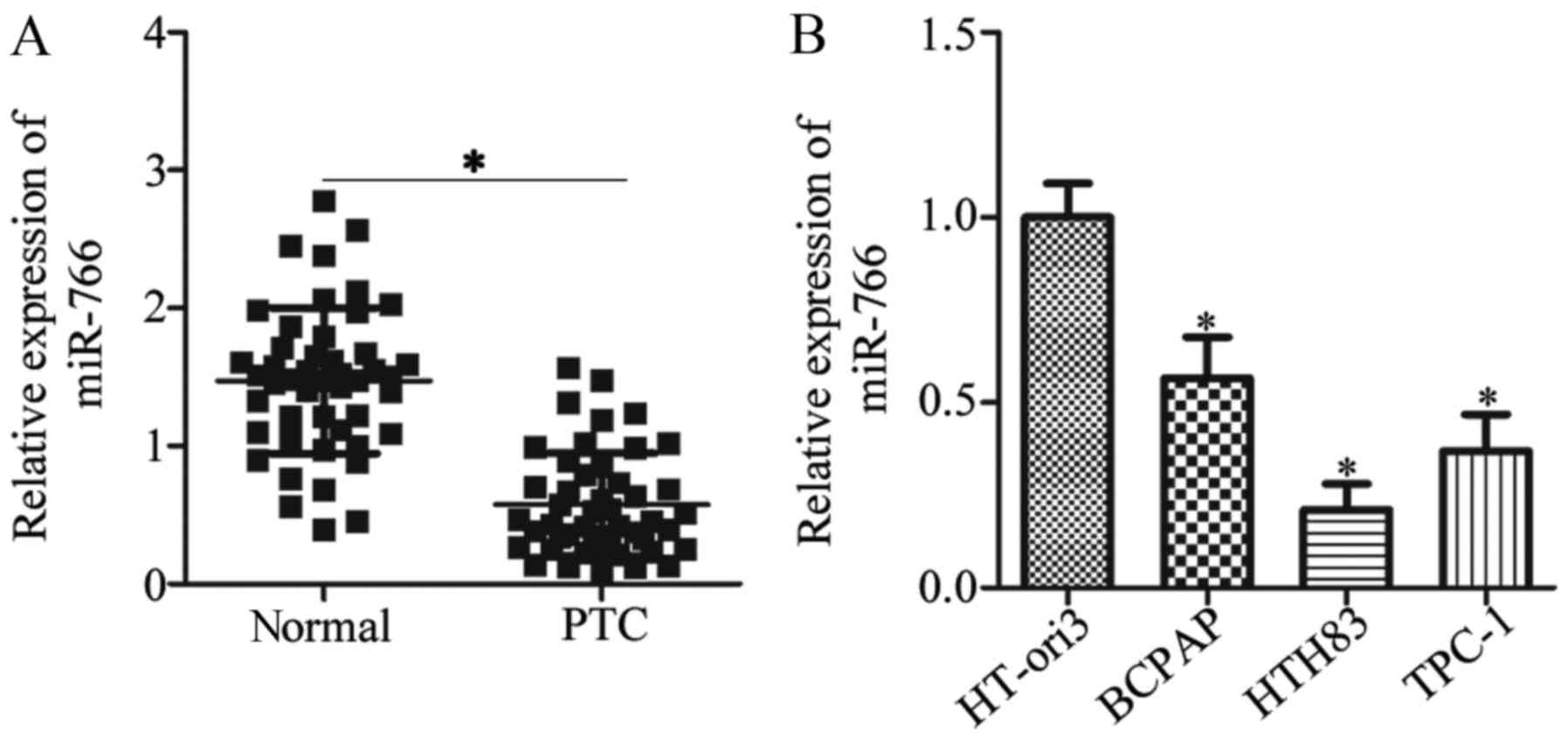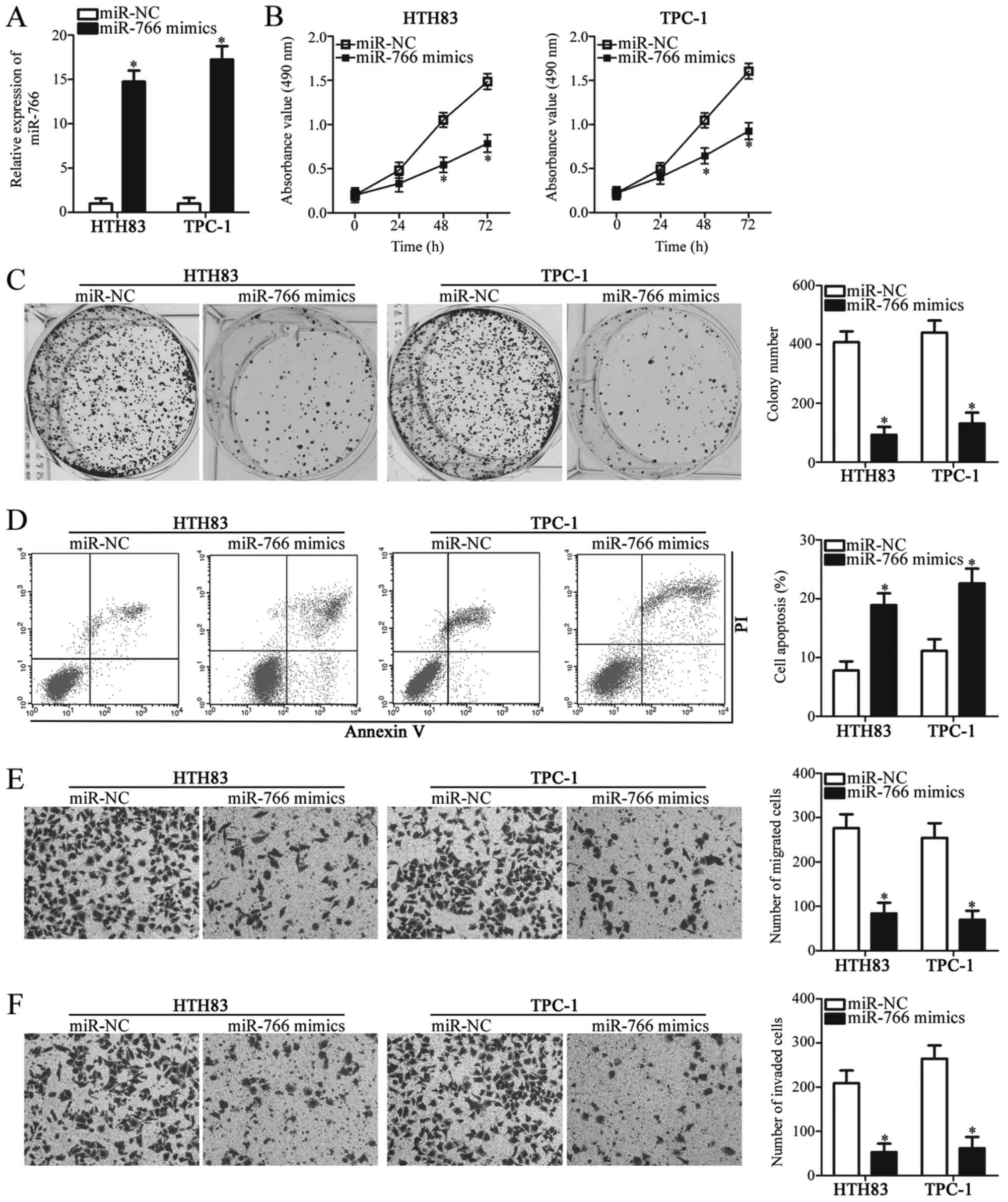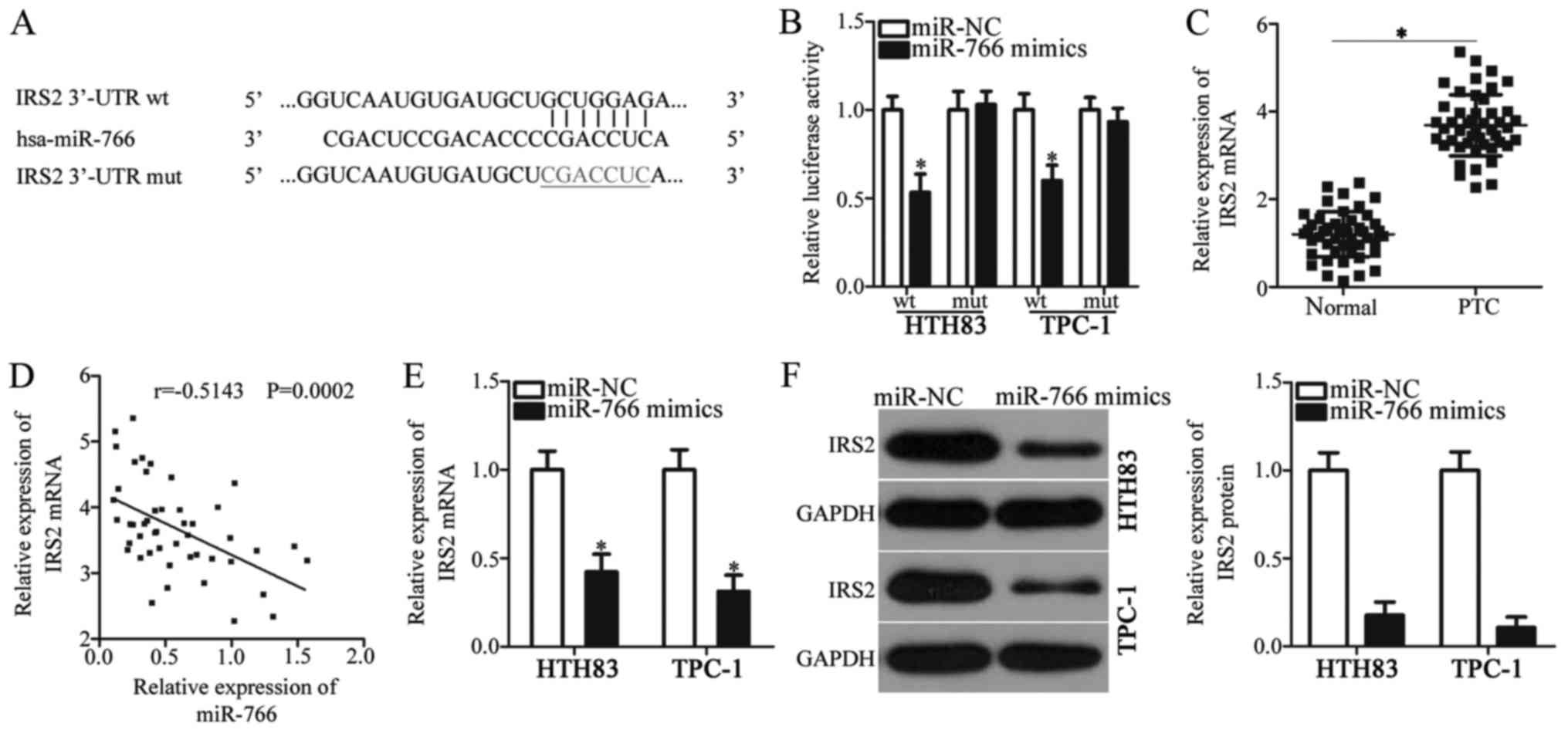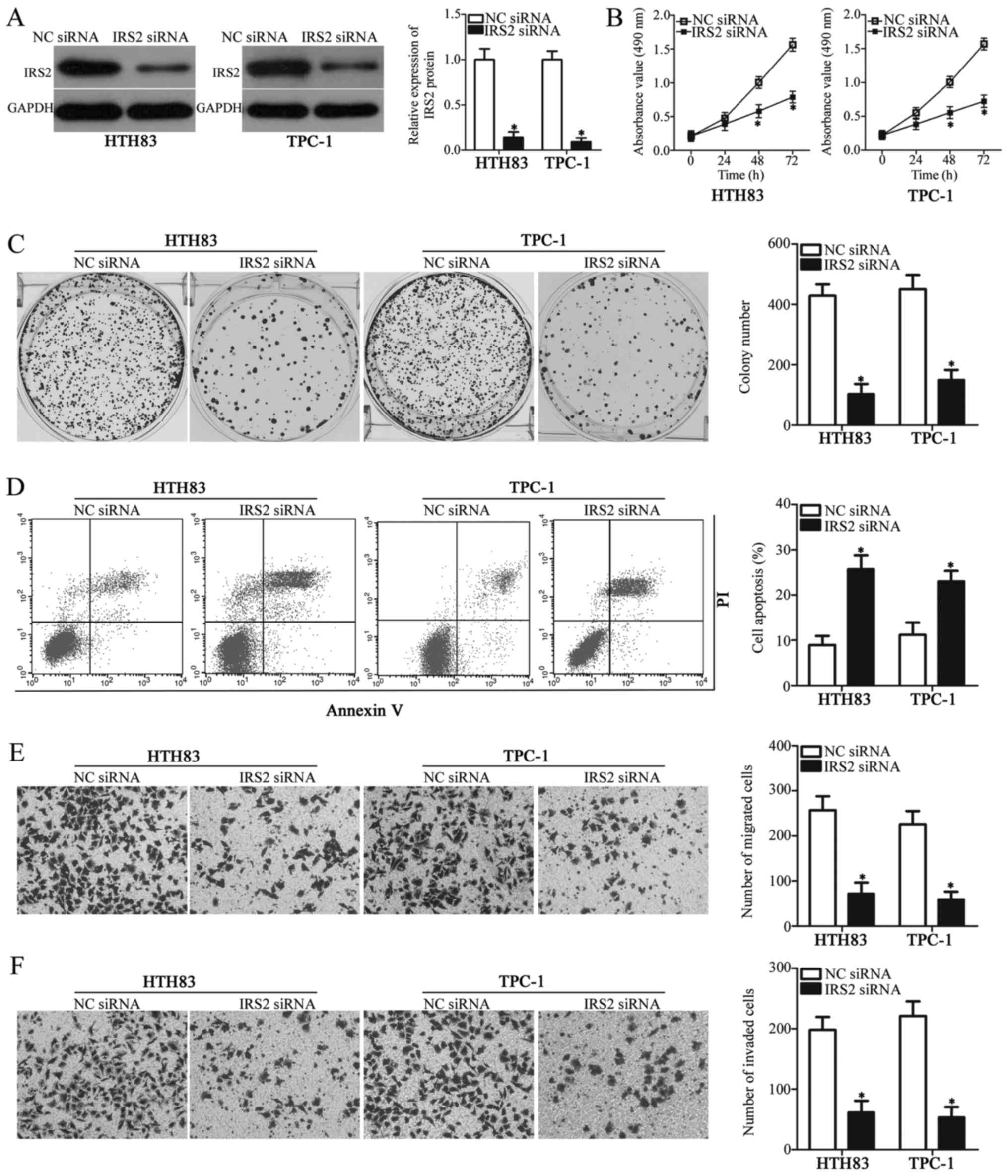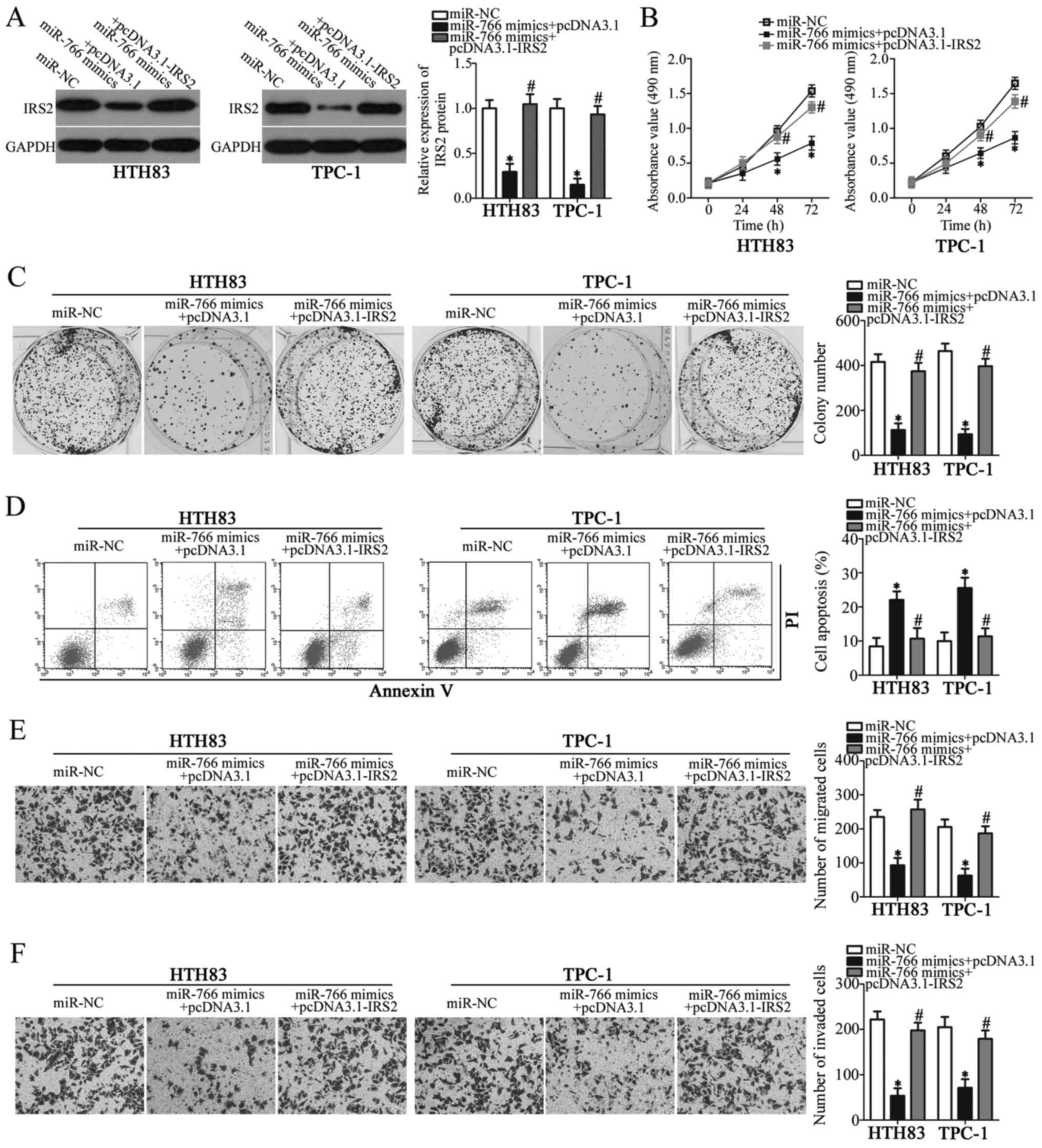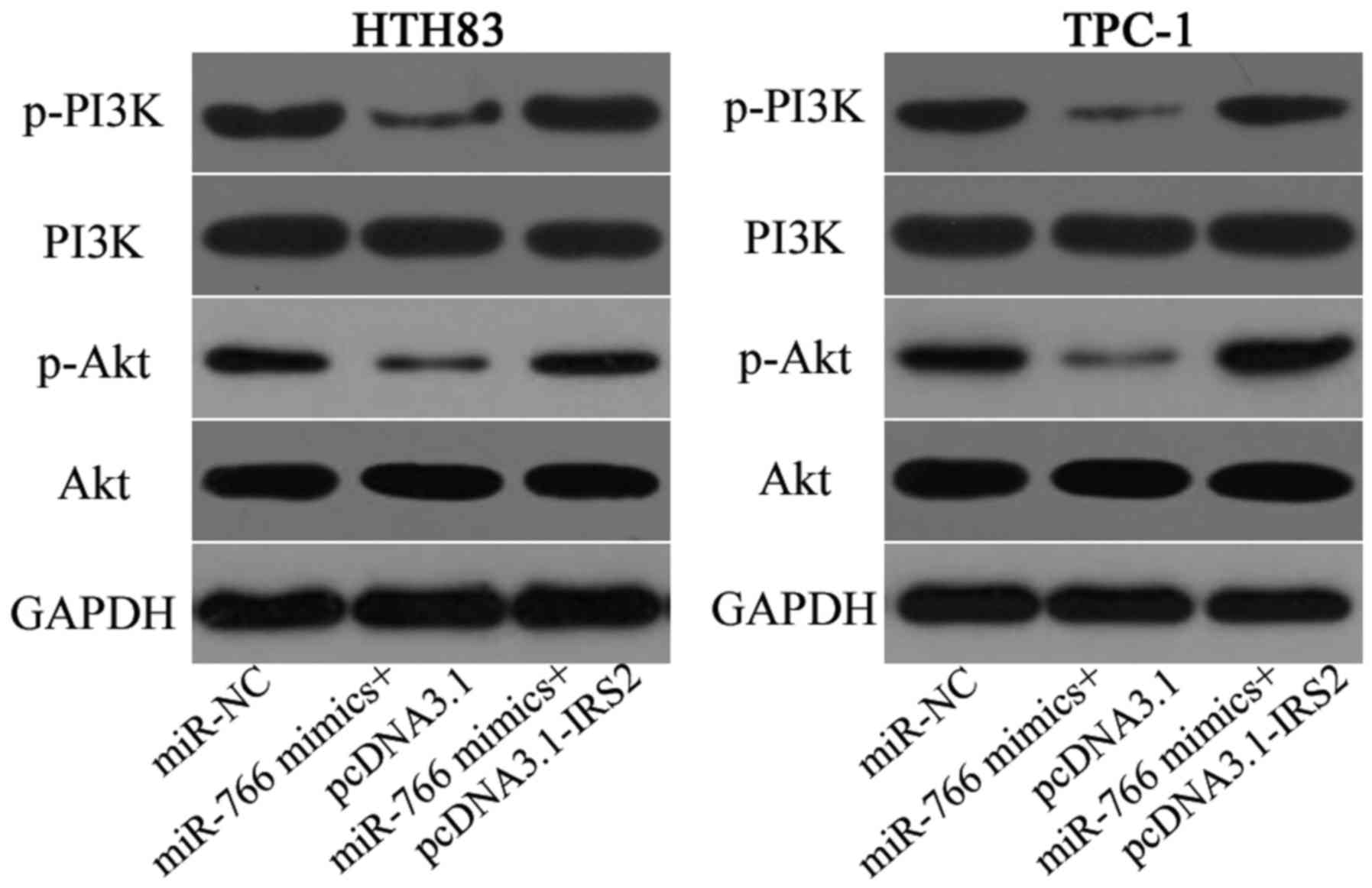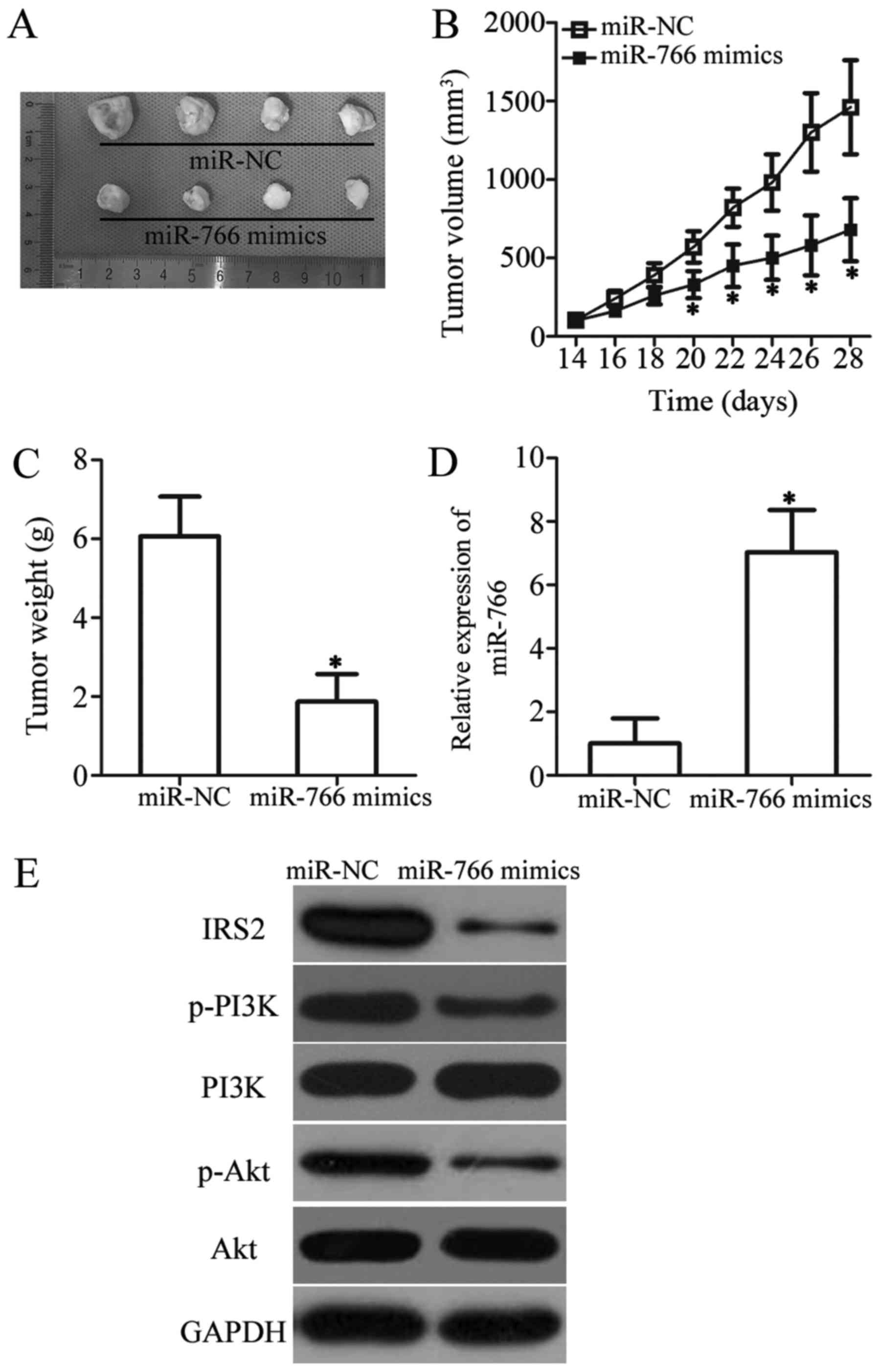|
1
|
Xiang D, Xie L, Xu Y, Li Z, Hong Y and
Wang P: Papillary thyroid microcarcinomas located at the middle
part of the middle third of the thyroid gland correlates with the
presence of neck metastasis. Surgery. 157:526–533. 2015. View Article : Google Scholar
|
|
2
|
Kim HY, Park WY, Lee KE, Park WS, Chung
YS, Cho SJ and Youn YK: Comparative analysis of gene expression
profiles of papillary thyroid microcarcinoma and papillary thyroid
carcinoma. J Cancer Res Ther. 6:452–457. 2010. View Article : Google Scholar
|
|
3
|
Siegel RL, Miller KD and Jemal A: Cancer
statistics, 2015. CA Cancer J Clin. 65:5–29. 2015. View Article : Google Scholar : PubMed/NCBI
|
|
4
|
Ye Y, Zhuang J, Wang G, He S, Ni J and Xia
W: MicroRNA-139 targets fibronectin 1 to inhibit papillary thyroid
carcinoma progression. Oncol Lett. 14:7799–7806. 2017.PubMed/NCBI
|
|
5
|
Catalano MG, Poli R, Pugliese M, Fortunati
N and Boccuzzi G: Emerging molecular therapies of advanced thyroid
cancer. Mol Aspects Med. 31:215–226. 2010. View Article : Google Scholar : PubMed/NCBI
|
|
6
|
Peng XG, Chen ZF, Zhang KJ, Wang PG, Liu
ZM, Chen ZJ, Hou GY and Niu M: VEGF Trapon inhibits tumor growth in
papillary thyroid carcinoma. Eur Rev Med Pharmacol Sci. 19:235–240.
2015.PubMed/NCBI
|
|
7
|
Fagin JA and Wells SA Jr: Biologic and
clinical perspectives on thyroid cancer. N Engl J Med.
375:23072016. View Article : Google Scholar : PubMed/NCBI
|
|
8
|
Calin GA and Croce CM: MicroRNA signatures
in human cancers. Nat Rev Cancer. 6:857–866. 2006. View Article : Google Scholar : PubMed/NCBI
|
|
9
|
He L and Hannon GJ: MicroRNAs: Small RNAs
with a big role in gene regulation. Nat Rev Genet. 5:522–531. 2004.
View Article : Google Scholar : PubMed/NCBI
|
|
10
|
Dragomir M, Mafra ACP, Dias SMG, Vasilescu
C and Calin GA: Using microRNA Networks to understand cancer. Int J
Mol Sci. 19:192018. View Article : Google Scholar
|
|
11
|
Iorio MV, Casalini P, Tagliabue E, Ménard
S and Croce CM: MicroRNA profiling as a tool to understand
prognosis, therapy response and resistance in breast cancer. Eur J
Cancer. 44:2753–2759. 2008. View Article : Google Scholar : PubMed/NCBI
|
|
12
|
Aragon Han P, Weng CH, Khawaja HT,
Nagarajan N, Schneider EB, Umbricht CB, Witwer KW and Zeiger MA:
MicroRNA expression and association with clinicopathologic features
in papillary thyroid cancer: A systematic review. Thyroid.
25:1322–1329. 2015. View Article : Google Scholar : PubMed/NCBI
|
|
13
|
Yi R, Li Y, Wang FL, Miao G, Qi RM and
Zhao YY: MicroRNAs as diagnostic and prognostic biomarkers in
colorectal cancer. World J Gastrointest Oncol. 8:330–340. 2016.
View Article : Google Scholar : PubMed/NCBI
|
|
14
|
Uddin A and Chakraborty S: Role of miRNAs
in lung cancer. J Cell Physiol. Apr 20–2018.Epub ahead of print.
View Article : Google Scholar
|
|
15
|
Ahir BK, Ozer H, Engelhard HH and Lakka
SS: MicroRNAs in glioblastoma pathogenesis and therapy: A
comprehensive review. Crit Rev Oncol Hematol. 120:22–33. 2017.
View Article : Google Scholar : PubMed/NCBI
|
|
16
|
Homami A and Ghazi F: MicroRNAs as
biomarkers associated with bladder cancer. Med J Islam Repub Iran.
30:4752016.
|
|
17
|
Mutalib NS, Yusof AM, Mokhtar NM, Harun R,
Muhammad R and Jamal R: MicroRNAs and lymph node metastasis in
papillary thyroid cancers. Asian Pac J Cancer Prev. 17:25–35. 2016.
View Article : Google Scholar : PubMed/NCBI
|
|
18
|
Lee JC, Gundara JS, Glover A, Serpell J
and Sidhu SB: MicroRNA expression profiles in the management of
papillary thyroid cancer. Oncologist. 19:1141–1147. 2014.
View Article : Google Scholar : PubMed/NCBI
|
|
19
|
Zhu G, Xie L and Miller D: Expression of
microRNAs in thyroid carcinoma. Methods Mol Biol. 1617:261–280.
2017. View Article : Google Scholar : PubMed/NCBI
|
|
20
|
Fu YT, Zheng HB, Zhang DQ, Zhou L and Sun
H: MicroRNA-1266 suppresses papillary thyroid carcinoma cell
metastasis and growth via targeting FGFR2. Eur Rev Med Pharmacol
Sci. 22:3430–3438. 2018.PubMed/NCBI
|
|
21
|
Wang R, Ma Q, Ji L, Yao Y, Ma M and Wen Q:
miR-622 suppresses tumor formation by directly targeting VEGFA in
papillary thyroid carcinoma. OncoTargets Ther. 11:1501–1509. 2018.
View Article : Google Scholar
|
|
22
|
Ma S, Jia W and Ni S: miR-199a-5p inhibits
the progression of papillary thyroid carcinoma by targeting SNAI1.
Biochem Biophys Res Commun. 497:181–186. 2018. View Article : Google Scholar : PubMed/NCBI
|
|
23
|
Chen C, Xue S, Zhang J, Chen W, Gong D,
Zheng J, Ma J, Xue W, Chen Y, Zhai W, et al:
DNA-methylation-mediated repression of miR-766-3p promotes cell
proliferation via targeting SF2 expression in renal cell carcinoma.
Int J Cancer. 141:1867–1878. 2017. View Article : Google Scholar : PubMed/NCBI
|
|
24
|
Li X, Shi Y, Yin Z, Xue X and Zhou B: An
eight-miRNA signature as a potential biomarker for predicting
survival in lung adenocarcinoma. J Transl Med. 12:1592014.
View Article : Google Scholar : PubMed/NCBI
|
|
25
|
Suresh R, Sethi S, Ali S, Giorgadze T and
Sarkar FH: Differential expression of microRNAs in papillary
thyroid carcinoma and their Role in Racial Disparity. J Cancer Sci
Ther. 7:145–154. 2015.PubMed/NCBI
|
|
26
|
Livak KJ and Schmittgen TD: Analysis of
relative gene expression data using real-time quantitative PCR and
the 2(−Delta Delta C(T)) Method. Methods. 25:402–408. 2001.
View Article : Google Scholar
|
|
27
|
Dong S, Meng X, Xue S, Yan Z, Ren P and
Liu J: microRNA-141 inhibits thyroid cancer cell growth and
metastasis by targeting insulin receptor substrate 2. Am J Transl
Res. 8:1471–1481. 2016.PubMed/NCBI
|
|
28
|
Landis J and Shaw LM: Insulin receptor
substrate 2-mediated phosphatidylinositol 3-kinase signaling
selectively inhibits glycogen synthase kinase 3β to regulate
aerobic glycolysis. J Biol Chem. 289:18603–18613. 2014. View Article : Google Scholar : PubMed/NCBI
|
|
29
|
Mercado-Matos J, Clark JL, Piper AJ,
Janusis J and Shaw LM: Differential involvement of the microtubule
cytoskeleton in insulin receptor substrate 1 (IRS-1) and IRS-2
signaling to AKT determines the response to microtubule disruption
in breast carcinoma cells. J Biol Chem. 292:7806–7816. 2017.
View Article : Google Scholar : PubMed/NCBI
|
|
30
|
Jeong SH and Lim DS: Insulin receptor
substrate 2: A bridge between Hippo and AKT pathways. BMB Rep.
51:209–210. 2018. View Article : Google Scholar : PubMed/NCBI
|
|
31
|
Hu J, Li C, Liu C, Zhao S, Wang Y and Fu
Z: Expressions of miRNAs in papillary thyroid carcinoma and their
associations with the clinical characteristics of PTC. Cancer
Biomark. 18:87–94. 2017. View Article : Google Scholar : PubMed/NCBI
|
|
32
|
Yoruker EE, Terzioglu D, Teksoz S, Uslu
FE, Gezer U and Dalay N: MicroRNA expression profiles in papillary
thyroid carcinoma, benign thyroid nodules and healthy controls. J
Cancer. 7:803–809. 2016. View Article : Google Scholar : PubMed/NCBI
|
|
33
|
Hu Y, Wang H, Chen E, Xu Z, Chen B and Lu
G: Candidate microRNAs as biomarkers of thyroid carcinoma: A
systematic review, meta-analysis, and experimental validation.
Cancer Med. 5:2602–2614. 2016. View Article : Google Scholar : PubMed/NCBI
|
|
34
|
Oh K and Lee DS: In vivo validation of
metastasis-regulating microRNA-766 in human triple-negative breast
cancer cells. Lab Anim Res. 33:256–263. 2017. View Article : Google Scholar : PubMed/NCBI
|
|
35
|
Li YC, Li CF, Chen LB, Li DD, Yang L, Jin
JP and Zhang B: MicroRNA-766 targeting regulation of SOX6
expression promoted cell proliferation of human colorectal cancer.
OncoTargets Ther. 8:2981–2988. 2015. View Article : Google Scholar
|
|
36
|
Afgar A, Fard-Esfahani P, Mehrtash A,
Azadmanesh K, Khodarahmi F, Ghadir M and Teimoori-Toolabi L:
miR-339 and especially miR-766 reactivate the expression of tumor
suppressor genes in colorectal cancer cell lines through DNA
methyltransferase 3B gene inhibition. Cancer Biol Ther.
17:1126–1138. 2016. View Article : Google Scholar : PubMed/NCBI
|
|
37
|
White MF: IRS proteins and the common path
to diabetes. Am J Physiol Endocrinol Metab. 283:E413–E422. 2002.
View Article : Google Scholar : PubMed/NCBI
|
|
38
|
Day E, Poulogiannis G, McCaughan F,
Mulholland S, Arends MJ, Ibrahim AE and Dear PH: IRS2 is a
candidate driver oncogene on 13q34 in colorectal cancer. Int J Exp
Pathol. 94:203–211. 2013.PubMed/NCBI
|
|
39
|
Ma Y, Zhang H, He X, Song H, Qiang Y, Li
Y, Gao J and Wang Z: miR-106a* inhibits the
proliferation of renal carcinoma cells by targeting IRS-2. Tumour
Biol. 36:8389–8398. 2015. View Article : Google Scholar : PubMed/NCBI
|
|
40
|
Xu H, Lee MS, Tsai PY, Adler AS, Curry NL,
Challa S, Freinkman E, Hitchcock DS, Copps KD, White MF, et al:
Ablation of insulin receptor substrates 1 and 2 suppresses
Kras-driven lung tumorigenesis. Proc Natl Acad Sci USA.
115:4228–4233. 2018. View Article : Google Scholar
|
|
41
|
Porter HA, Perry A, Kingsley C, Tran NL
and Keegan AD: IRS1 is highly expressed in localized breast tumors
and regulates the sensitivity of breast cancer cells to
chemotherapy, while IRS2 is highly expressed in invasive breast
tumors. Cancer Lett. 338:239–248. 2013. View Article : Google Scholar : PubMed/NCBI
|
|
42
|
Zhang P, Shao G, Lin X, Liu Y and Yang Z:
miR-338-3p inhibits the growth and invasion of non-small cell lung
cancer cells by targeting IRS2. Am J Cancer Res. 7:53–63.
2017.PubMed/NCBI
|
|
43
|
de Melo Campos P, Machado-Neto JA, Eide
CA, Savage SL, Scopim-Ribeiro R, da Silva Souza Duarte, Favaro PA,
Lorand-Metze I, Costa FF, Tognon CE, et al: IRS2 silencing
increases apoptosis and potentiates the effects of ruxolitinib in
JAK2V617F-positive myeloproliferative neoplasms. Oncotarget.
7:6948–6959. 2016.PubMed/NCBI
|
|
44
|
Liu H, Ren G, Zhu L, Liu X and He X: The
upregulation of miRNA-146a inhibited biological behaviors of ESCC
through inhibition of IRS2. Tumour Biol. 37:4641–4647. 2016.
View Article : Google Scholar
|















